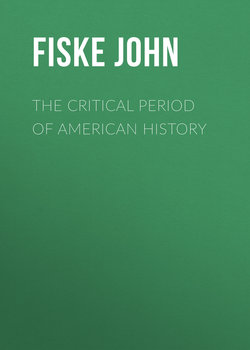The Critical Period of American History

Реклама. ООО «ЛитРес», ИНН: 7719571260.
Оглавление
Fiske John. The Critical Period of American History
PREFACE
CHAPTER I. RESULTS OF YORKTOWN
CHAPTER II. THE THIRTEEN COMMONWEALTHS
CHAPTER III. THE LEAGUE OF FRIENDSHIP
CHAPTER IV. DRIFTING TOWARD ANARCHY
CHAPTER V. GERMS OF NATIONAL SOVEREIGNTY
CHAPTER VI. THE FEDERAL CONVENTION
CHAPTER VII. CROWNING THE WORK
BIBLIOGRAPHICAL NOTE
MEMBERS OF THE FEDERAL CONVENTION
Отрывок из книги
This book contains the substance of the course of lectures given in the Old South Meeting-House in Boston in December, 1884, at the Washington University in St. Louis in May, 1885, and in the theatre of the University Club in New York in March, 1886. In its present shape it may serve as a sketch of the political history of the United States from the end of the Revolutionary War to the adoption of the Federal Constitution. It makes no pretensions to completeness, either as a summary of the events of that period or as a discussion of the political questions involved in them. I have aimed especially at grouping facts in such a way as to bring out and emphasize their causal sequence, and it is accordingly hoped that the book may prove useful to the student of American history.
My title was suggested by the fact of Thomas Paine's stopping the publication of the "Crisis," on hearing the news of the treaty of 1783, with the remark, "The times that tried men's souls are over." Commenting upon this, on page 55 of the present work, I observed that so far from the crisis being over in 1783, the next five years were to be the most critical time of all. I had not then seen Mr. Trescot's "Diplomatic History of the Administrations of Washington and Adams," on page 9 of which he uses almost the same words: "It must not be supposed that the treaty of peace secured the national life. Indeed, it would be more correct to say that the most critical period of the country's history embraced the time between 1783 and the adoption of the Constitution in 1788."
.....
The Americans retained the right of catching fish on the banks of Newfoundland and in the Gulf of St. Lawrence, but lost the right of drying their fish on the Newfoundland coast. On the other hand, no permission was given to British subjects to fish on the coasts of the United States. As regarded commercial intercourse, Jay sought to establish complete reciprocal freedom between the two countries, and a clause was proposed to the effect that "all British merchants and merchant ships, on the one hand, shall enjoy in the United States, and in all places belonging to them, the same protection and commercial privileges, and be liable only to the same charges and duties as their own merchants and merchant ships; and, on the other hand, the merchants and merchant ships of the United States shall enjoy in all places belonging to his Britannic Majesty the same protection and commercial privileges, and be liable only to the same charges and duties as British merchants and merchant ships, saving always to the chartered trading companies of Great Britain such exclusive use and trade, and the respective ports and establishments, as neither the other subjects of Great Britain nor any the most favoured nation participate in." Unfortunately for both countries, this liberal provision was rejected on the ground that the ministry had no authority to interfere with the Navigation Act.
Only two questions were now left to be disposed of, – the question of paying private debts, and that of compensating the American loyalists for the loss of property and general rough treatment which they had suffered. There were many old debts outstanding from American to British merchants. These had been for the most part incurred before 1775, and while many honest debtors, impoverished during the war, felt unable to pay, there were doubtless many others who were ready to take advantage of circumstances and refuse the payment which they were perfectly able to make. It was scarcely creditable to us that any such question should have arisen. Franklin, indeed, argued that these debts were more than fully offset by damages done to private property by British soldiers: as, for example, in the wanton raids on the coasts of Connecticut and Virginia in 1779, or in Prevost's buccaneering march against Charleston. To cite these atrocities, however, as a reason for the non-payment of debts legitimately owed to innocent merchants in London and Glasgow was to argue as if two wrongs could make a right. The strong sense of John Adams struck at once to the root of the matter. He declared "he had no notion of cheating anybody. The questions of paying debts and compensating Tories were two." This terse statement carried the day, and it was finally decided that all private debts on either side, whether incurred before or after 1775, remained still binding, and must be discharged at their full value in sterling money.
.....